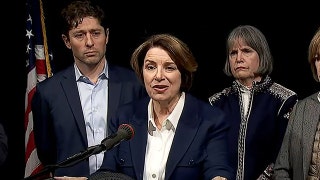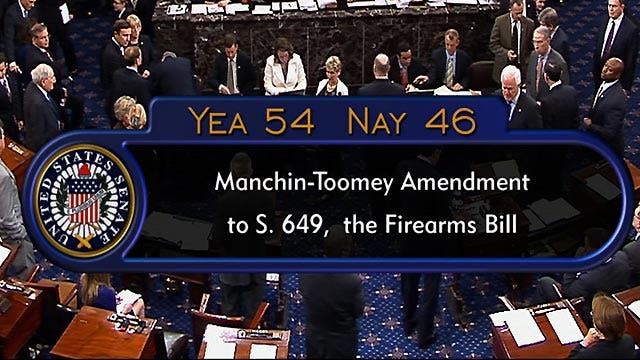Senate Majority Leader Harry Reid effectively pulled his party's gun control bill Thursday after a critical background check amendment failed to garner enough support, as he and other Democrats vowed to resume their push for new gun laws in the months ahead.
"Make no mistake, this debate is not over," Reid said. He acknowledged that he and President Obama had agreed to hit "pause" on the current package, but said the Senate would "come back to this bill" and take up expanded background checks.
At the same time, critics of the legislation vowed to ensure any future proposals protect both "the lives and liberty" of Americans.
Both sides of the debate, it seemed, were gearing up for a protracted legislative battle that could last through the next congressional election. Democrats appeared to acknowledge that the amendment's failure Wednesday meant they would not be able to pass any gun bill in the short-term, despite initial claims that the mass shooting in Newtown, Conn., might spur a hasty legislative response in Congress.
The amendment that was defeated Wednesday would have expanded background checks to gun shows and Internet sales, while exempting personal transactions. It failed on a 54-46 vote; it needed 60 to pass.
Opponents, which included Republicans and rural-state Democrats, said the measure would infringe on Second Amendment rights by imposing a burden on law-abiding gun owners while doing little to stop criminals. They also repeated the concern that the system could lead to a gun registry, though the amendment language prohibited this.
Both sides of the debate indicated a willingness to keep working toward new legislation to address gun violence. But the debate became far more combative in the wake of Wednesday's vote. While Republicans want more of a focus on the mental health system, school security and the entertainment industry, Democrats are focusing even harder on background checks.
Obama, speaking in the Rose Garden late Wednesday, sought to shame those who voted against the background check plan and accused the gun lobby of lying about the bill to scare lawmakers.
"All in all, this was a pretty shameful day for Washington," Obama said. He called the vote "just round one."
Obama's campaign arm, Organizing for Action, swiftly began planning the next round. The group's director, Jon Carson, announced events this Saturday "in states where senators hold the key to expanding background checks."
Republicans bristled at Obama's comments. "When good and honest people have honest differences of opinion about what policies our country should pursue when it comes to the Second Amendment and gun rights and mass gun violence, the President of the United States should not accuse them of having no coherent arguments or caving to the pressure," Sen. John Cornyn, R-Texas, said.
It's unclear exactly how Democrats will proceed. Reid, in freezing the bill, preserves the option of returning to it at a later date.
Sen. Joe Manchin, D-W.Va., who helped craft the bipartisan plan widening background checks, said he would continue talking to other senators to see whether there were changes he could make that would attract their votes.
Senate Democrats could call a do-over vote with a revised piece of legislation.
But they also appeared to acknowledge the deep resistance to any legislation seen to curb gun rights, and threatened to take the campaign into the 2014 congressional elections.
"If this Congress refuses to listen to the American people and pass common-sense gun legislation, then the real impact is going to have to come from the voters," Obama said.
Obama blamed lawmakers' fear that "the gun lobby would spend a lot of money" and accuse them of opposing the Second Amendment's right to bear arms.
But opponents of the restrictions -- which would have been the most meaningful gun curbs approved by Congress in two decades -- said the curbs were defeated because they wouldn't have worked.
Sen. Jim Inhofe, R-Okla., said most proposals were "predicated on one assumption that somehow we think that the criminal element will single out this one law to comply with."
Added Sen. Richard Shelby, R-Ala., of the expanded background check plan, "This is the first step in the erosion of my rights under the Second Amendment."
The day was not a complete victory for the NRA. Senators defeated one GOP amendment requiring states that let people carry concealed weapons to honor other states' concealed carry permits. Also rejected was a Republican proposal letting some veterans with mental problems have firearms unless a court blocks them from getting the weapons.
No. 2 Senate leader Richard Durbin, D-Ill., was among several Democrats who joined Obama in saying Wednesday's roll calls left them with an issue to take to voters.
"We're now in the world of Gabby Giffords and Mayor Bloomberg and organizations that are organized to come out and support those who vote for gun safety and oppose those who don't," he said, referring to wealthy New York Mayor Michael Bloomberg, who has been financing gun control efforts.
But Sen. Rand Paul, R-Ky., expressed doubts.
"If it were a real effective political strategy, you wouldn't have seen a lot of Democrats from Southern states voting with Republicans today," he said.
Some Western Democrats voted against restrictions as well.
NRA lobbyist Chris W. Cox thanked lawmakers for defeating the "misguided" background check expansion, saying it would have criminalized gun transactions between friends -- a charge Obama and others called untrue.
Mayors Against Illegal Guns, financed by Michael Bloomberg, called the vote "a damning indictment" of the gun lobby's power.
The Associated Press contributed to this report.













































